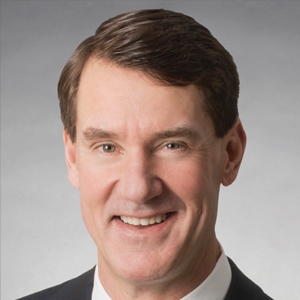The forecast for regional US banks remains cloudy with a chance of regulatory relief
A deep-seated fear of being overshadowed by the shadow banking industry is driving a campaign among regional banks to improve their capacity to lend to Main Street businesses in any industry across the US. This modest business line has traditionally been the strong suit of the eight banks that won our award for Best Regional Bank in the US.

Although interest rates are poised to rise, commercial loan growth has been painfully slow for regional banks in the last couple of quarters. At the same time, they are waiting for President Donald Trump to make good on promises to ease the regulatory burden on industries that he has identified as critical to the growth of the US economy, including banking and energy.
“The challenge for regional banks is just finding good quality earning asset growth,” says Harris Simmons, chairman and CEO of Zions Bancorporation in Salt Lake City, Utah, which won our award for the Rocky Mountain region.
A key issue is that alternative lenders—from credit hedge funds, to fintech firms, to lending clubs that charge lower interest rates—are emerging as the main competitors to regional banks, according to Simmons. In response, regional banks are scrambling to make their small and mid-market lending businesses more efficient.
“In small-business loans, we have totally reengineered the process over the last year. We are just in the process of rolling it out,” says Simmons. “We’ve eliminated a lot of steps in the process, where we had multiple people approving parts of the deal, and just streamlined the underwriting process.”
Regional banks are playing on a critical advantage they have long enjoyed over national “money center” banks like Citi, JPMorgan Chase or Wells Fargo. Regional banks enjoy the unparalleled capacity of relationship managers at local branches to keep track of thousands of small loans in their own backyards. Zions, for example, issues corporate loans in amounts as low as $25,000 to small and medium-size companies across the spectrum of retail, manufacturing, agricultural and other industries; but its median loan size is $5 million, according to Simmons.

More importantly, these relationship managers are known for their expertise in local industries, making them immune to the knee-jerk reaction of reining in credit lines when those industries fall into cyclical downturns. First Republic, our winner for the Far West, specializes in bridge loans for private equity and venture capital in Silicon Valley, with a legacy strength in private wealth management for Hollywood stars and magnates. Eastern Bank of Boston, Massachusetts, our winner for New England, specializes in financing local commercial and residential real estate developers. Comerica of Dallas, Texas, our winner for the Southwest, is known for its expertise in the energy industry, which accounts for about two-thirds of its customers. U.S. Bancorp of Minneapolis, Minnesota, our winner for the Plains region, receives high marks from small and medium-size companies for loans, lines of credit, and cash management. KeyCorp of Cleveland, Ohio, our winner in the Great Lakes region, wins kudos from its corporate clients for account management, fees, and problem resolution.
“As a Main Street bank, PNC is organized around a local-delivery model that is built on strong relationships that make us part of the communities we serve,” says Bill Demchak, chairman, president and CEO of PNC Financial Services Group in Pittsburgh, Pennsylvania, which won our award for the Mid-Atlantic. “This combination of local decision-making, backed by PNC, gives us a distinct advantage over our larger competitors and allows us to better serve all of our stakeholders.”
SunTrust, our winner for the Southeast, has taken this strategy one step further through its ownership of SunTrust Robinson Humphrey, an investment bank with in-depth industry expertise in business services, financial sponsors, building products, healthcare, consumer and retail, media and communications, energy, transportation, financial services and technology, and real estate. SunTrust raises funds for its clients in real estate investment trusts (REITs), initial public offerings (IPOs), bond issues, and other capital-market transactions.

“Our strategy has been to bring together that industry and product expertise in a way that’s unique, serving that middle-market client a little bit differently than they’ve been served historically by other regional or superregional banks,” says Allison Dukes, head of commercial and business banking at SunTrust in Atlanta, Georgia.
The effort is shrewdly timed. Earlier this year, SunTrust’s annual business-confidence survey of small and mid-market businesses found that they were optimistic on not just the growth of the US economy but their own business growth. In particular, the survey discovered that they were looking for ways to capitalize on anticipated tax cuts under the Trump administration.
“In order to help mid-market clients meet their growth objectives, SunTrust recently added a dedicated team to serve commercial M&A needs, which are expected to be strong over the next few years,” says Dukes. “This will allow us to continue to deploy our capital-markets products and expertise from across our platform to serve clients in both upper and lower-middle markets.”
Of course, the risk of lending more money to small companies is that defaults could rise if the economic gains peter out this year. So, as they gear up for a commercial lending spree, regional banks are simultaneously stepping up their own investments in managing the risks involved. “That’s an area where we remain very vigilant around credit-risk management,” says Dukes.
Still, these efforts won’t be enough to ensure the continued growth of regional banks without easing a regulatory burden that has imposed many of the same restrictions that Wall Street banks face. “Regional and small banks that play a vital role in our economy are being hamstrung by one-size-fits-all regulation as it has evolved since the financial crisis,” says PNC’s Bill Demchak. “Regional banks like PNC and community banks differ dramatically from the global systemically important banks on Wall Street. We don’t represent the same sort of systemic risk.”
This year, regional banks are depending on the Trump administration to ease the costly burden of banking regulation. “What we’re seeing in the new administration is an attitude that they want to see banks helping the economy to grow,” says Zions’s Simmons. “In the discussions I’ve been part of, and have seen taking place, the regulators and some of the senior people in the administration want to be sure that the cumulative weight of all of the regulations coming out of Dodd-Frank doesn’t totally suffocate the industry and drive all of the business to nonbank lenders.”
Such encouraging signs from Washington have afforded enough confidence that the finance industry will flourish at the local level to plan expansions in specific corporate banking lines this year. “Specific to corporate customers, we believe we have real near-term opportunities in the treasury management piece of our business,” says Demchak. “In the coming year, we will be focusing on an expansion of our middle-market franchise.”
PNC also plans to offer new services for corporate clients that do business across borders. “We also will continue to develop innovative solutions to meet the unique needs of our corporate and institutional banking customers doing business internationally, where we already have helped to lead the effort to build secure person-to-person and business-to-consumer, real-time payment solutions,” says Demchak.
With the scent of ambition in the air, it’s hard to imagine what—if anything—is holding back these banks. “Generally, most regional banks are feeling like there is a little more tailwind than headwind at the moment with the prospect of possible further modest interest rate hikes, which would help regional banks’ net interest margins,” concludes Simmons. They can use all the help they can get.
|
Best Regional Banks In The US 2017 |
|
|
New England |
Eastern Bank |
|
Mid-Atlantic |
PNC |
|
Great Lakes |
KeyCorp |
|
Plains |
U.S. Bancorp |
|
Southeast |
SunTrust |
|
Southwest |
Comerica |
|
Rocky Mountain |
Zions Bancorp |
|
Far West |
First Republic |



